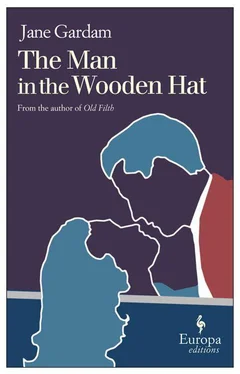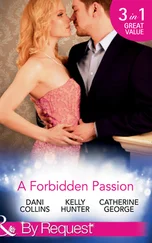“That rat wasn’t there to write letters!”
Forty or so years on, in Dorset in her Lavendo-polished house and weedless garden, driving her car weekly to the car wash, refusing to keep a dog because of mud on its paws, a blast of memory sometimes overcame her. There sat the rat on the airer. It was her falling point. It was the rat eternal. It had been the sign that she must now take charge.
“Isn’t there a hotel? Isn’t the Grosvenor around here? At Victoria Station? We’ll get the luggage back on the pavement and go there in a cab.”
“We’d never get another taxi in this fog,” he said, and at once a taxi swam out of the night, its headlamps as comforting as Florence Nightingale.
“I’m not sure if I’ve any English money left,” he said.
“I have,” she said. “I bought some at the airport. Slam the front door behind you.”
She climbed in, and after a moment he followed.
And at Grosvenor Place they were out, they were in the foyer and the cabman paid off while Edward still stood frowning on the pavement in his linen suit. “This hotel smells. It smells of beer and tobacco and fry. It’s probably full up.” But she secured a room.
In bed he said, “I always rather liked rats.”
That night in the Grosvenor in an unheated bedroom, shunting steam trains clamouring below, yellow fingers of fog painting the window and a mat from the floor on top of the skimpy eiderdown, Edward began to laugh. “I am the rat ,” he said, grabbing her. “I came with you in the taxi.”
Scene in HK. Rosewood dining table. In middle age.
Fin de Siècle .
Edward ( to guests ): End of my freedom, you know. Minute we reached London, she took me over. She and the clerk and, of course, Albert Ross. Needn’t have existed outside work.
All: Well, you did work, Filth! How you worked!
Edward: Yes. Work at last began to come in. Remember, Betty?
Elisabeth: I do.
Edward: Don’t know what you did with yourself in the evenings, poor child. You looked about sixteen. All alone.
Elisabeth: Not exactly.
By the morning the fog had lifted and Edward was off to Chambers with his laundry and papers by nine o’clock. Across the table of the gloomy breakfast room at the Grosvenor Hotel, he handed Elisabeth the keys of the maisonette.
As soon as he’d gone she picked up the keys, asked for the luggage to be brought down and taken round to the station left-luggage office. She paid the bill and set off on foot, bravely, to Edward’s horrible domain.
As she reached the corner of Ebury Street the fog rolled away and she saw that Edward’s side of the street was beautiful in morning light. The façade was faded and gentle and seemed like paper, an unfinished film set, almost bending in the wind. The eighteenth-century windows that had withstood the bomb blasts all around were unwashed, yet clear, set in narrow panes. Little shops on to the pavement ran all along, and doors to the houses above had rounded fanlights. Each house had three storeys. There were two tall first-floor windows side by side with pretty iron balconies. The shop at street level beside Edward’s front door seemed to be a greengrocer’s with boxes and sacks spread about the pavement and a very fat short man in a buff overall was standing, hands in pockets, on the step. “Morning,” he said, blowing air out of his cheeks and looking at the sky.
“Are you open yet? Have you — anything?”
“ Anything ? I’d not say any thing. We have potatoes. Carrots. Celery, if required.”
“Have you — apples?”
He looked at her intently and said, “We might have an orange or two.”
“Oh! Could I have two pounds?”
“Where you been then, miss? I’ll sell you one orange.”
She followed him inside the shop where a doom-laden woman was perched high on a stool behind a desk.
“Look at my ankles,” she said, sticking one out. It bulged purple over the rim of a man’s carpet slipper, unstockinged. “D’you want a guess at the size of it?”
“It looks horribly swollen,” said Elisabeth.
“It’s sixteen inches round. Sixteen! And all water. That’s your National Health Service for you.”
“But you must go to the doctor at once.”
“And who does the accounts here? You reached home, then?”
“Home?”
“Next door. “Mr. Feathers is home,” they said, the electrician’s across the road. Mozart Electrics.”
“We’re — we’re just passing through. I’m Mrs. Feathers.”
“Well!” She rolled her eyes at her impassive husband, who was again on the step cornering the market. “Married!”
“You can have two,” he called over his shoulder. “But don’t ask for lemons.”
“Sack that cleaner,” said his wife. “She stays ten minutes. You’ll have to get scrubbing.”
“Oh, well. I don’t think we’re staying. We want to get something nearer the City.”
“You’ll be lucky,” said the woman. “But you are lucky, I can see that. There’d be a thousand after next door the minute you handed in the keys.”
“I saw a rat. Last night. We left.”
“Oh, rats. They’re all over the place, rats. Mr. Feathers used to complain sometimes, though he’s a perfect gentleman. ‘Have you by any chance got a dog, Mrs. — er?’ (He calls everyone Mrs. — er.) ‘Does your dog like rats?’ We said we didn’t know but we took it round and it stands there looking at this rat”—a huge wheezing and shaking soon taken up by the greengrocer on the step, the rolls of fat beneath the buff vibrating—“and it turns and walks out. The dog walks out. It was a big rat.”
“Well, I can’t live here,” said Elisabeth.
“I’ll get you the Corporation,” said the wife. “You’ll be clean and sweet there soon, you’ll see. D’you want some kippers?”
Elisabeth turned the key in Edward’s lock and then stood back for a while on the pavement, watching the electrical shop across the road opening up. A very arthritic old person stood watching her.
“Go on in,” he called. “You’ll be all right. ’Ere, I’ll come in with you,” and like one risen painfully from the dead he slowly crossed the road, cars stopping for him. “Takes me over an hour now to get up in the morning,” he said. “Now watch that bike. The stairs is steep but if I take it slow. . I’se easing. Now then. .”
In the kitchen the airer was unoccupied and through a beautiful window, its glazing bars as fine as spars, lay a long, green, tangled garden full of flowers. Upstairs and upstairs again were bedrooms with tipping floors and simple marble fireplaces. Edward’s narrow bed stood like a monk’s pallet in the middle of one room, on a mat. One fine old wardrobe. One upright chair. A decent bathroom led off, and now the higher view showed a row of other gardens on either side. On the other side from the green grass was a small lawn and forest trees blocking out Victoria Station’s engine sheds.
“Don’t you get too far in with her next door that side,” said the electrician. “I don’t mean Florrie with the ankles. I mean t’other side. You all a’right now?”
“Yes. Well. I shan’t be staying. We saw — well — rats.”
“From the river,” he said. “They have to go somewhere. There’s worse than rats. Now, this is a good house and so it should be. We hear it’s two pound a week rent. Mind, it’s all coming down for development soon. Miracle is that not a bomb touched it. All the big stuff came down — Eaton Square and so on — not a window broken here. Artisans’ dwellings, we are. But panelling original pine. I’ll leave you for the moment.”
“Thank you,” she called down after him. “Very much. Could you tell me why you’re called Mozart Electrics?”
Читать дальше












